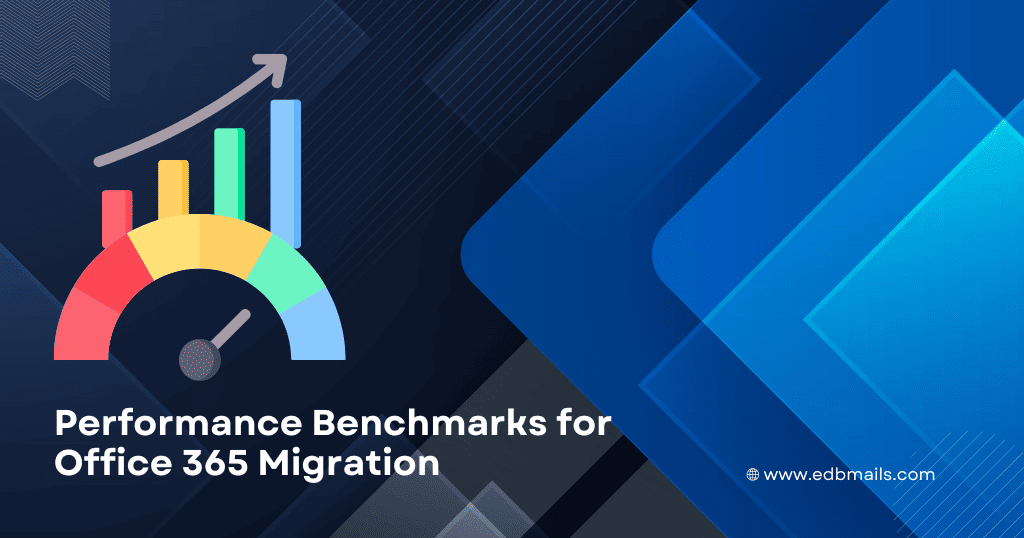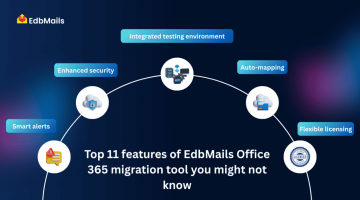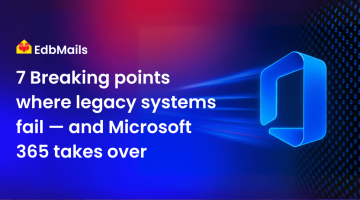Office 365 has become a cornerstone for modern businesses by offering productivity, collaboration, and secure file-sharing tools in a single ecosystem. With the flexibility to access data from anywhere and across devices, organizations are increasingly moving away from legacy systems and on-premises servers to adopt Office 365.
However, migration is not just about moving data—it’s about ensuring speed, accuracy, and minimal disruption to business operations. Before beginning the process, it is critical to understand the factors that influence migration performance and how they can affect outcomes.

Migrating to Office 365 offers businesses scalability, improved collaboration, and robust security. But achieving a seamless migration requires more than just planning—it requires the right tools.
EdbMails Office 365 Migration simplifies tenant-to-tenant migrations by offering automation, scalability, and high performance. It ensures that businesses can move their data without complexities, downtime, or risks to data integrity.
Factors affecting Office 365 migration performance
- Source of Data
The performance of your migration depends heavily on the source server. Hardware specifications such as CPU, memory, and storage speed influence how quickly data can be processed. Additionally, if the source server is under heavy workload, migration speed will be directly impacted. - Type of Data
Mailbox size alone doesn’t determine migration speed—data density plays a key role. For instance, a 5GB mailbox with 2,000 items will migrate faster than a 5GB mailbox containing 50,000 items. The higher the number of items, the longer it takes for the migration engine to process them. - Virtual Machines
In hybrid deployments, it is common to host the MRSProxy service on virtual machines. However, VM performance limitations can introduce significant bottlenecks during migration. - Inherent Limitations
The migration engine must extract data from the source, transfer it across the network, and insert it into Office 365 mailboxes. MRSProxy service, by design, has throughput restrictions, which can slow down the process regardless of other optimizations. - Firewall Configurations
Incorrect or restrictive firewall settings can block trusted migration connections. Unless properly configured, firewalls may create delays or failures in migration tasks. - Network Performance
Network bandwidth, latency, and stability are among the most critical factors in migration performance. Unstable connections or limited bandwidth can significantly slow down data transfer rates. - Office 365 Throttling Policies
Microsoft uses throttling policies to ensure service availability across tenants. These policies limit the maximum data transfer rate per mailbox, which can affect migration throughput despite having optimal hardware and network conditions. - Migrating All Data (Beyond Mailboxes)
Migration is not limited to emails. SharePoint, OneDrive, Teams, calendars, and contacts are equally critical. Neglecting these components can result in incomplete transitions and business disruptions. - Exchange Version Compatibility
Older Exchange versions, such as Exchange 2003, present compatibility challenges and often require downtime since users cannot access their mailboxes during migration. Newer Exchange versions offer improved compatibility and reduce disruption.
EdbMails Office 365 migration tool
EdbMails Office 365 migration tool is designed to eliminate the complexities and bottlenecks often faced with native Office 365 migration methods. The software offers incremental migration, which ensures that only new or updated items are transferred, preventing duplicates and saving time. With its ability to perform migrations with zero downtime, users can continue working without any disruption to their daily activities. The tool enables direct mailbox-to-mailbox transfers, removing the need for intermediate steps or manual configurations, and its simplified setup allows even non-technical administrators to initiate and complete migrations effortlessly.
In addition, EdbMails supports concurrent mailbox migration to accelerate large-scale projects, provides advanced filter options to selectively migrate specific folders, items, or date ranges, and ensures complete data security with end-to-end encryption. Administrators also benefit from automatic mailbox mapping, which reduces manual effort, and detailed migration reports that offer full transparency of the process. Together, these features make EdbMails a reliable, high-performance solution for organizations planning their move to Office 365.
Wrapping Up
Office 365 migration performance can be influenced by several factors, including server specifications, data density, throttling, and network conditions. While native methods like cutover or staged migrations are often complex and time-consuming, third-party tools provide a more reliable alternative.
EdbMails Office 365 Migration eliminates unnecessary bottlenecks and ensures a smooth, scalable, and secure migration process. If you’re planning your next migration project, explore the EdbMails free demo or connect with their support team to experience a hassle-free transition.



